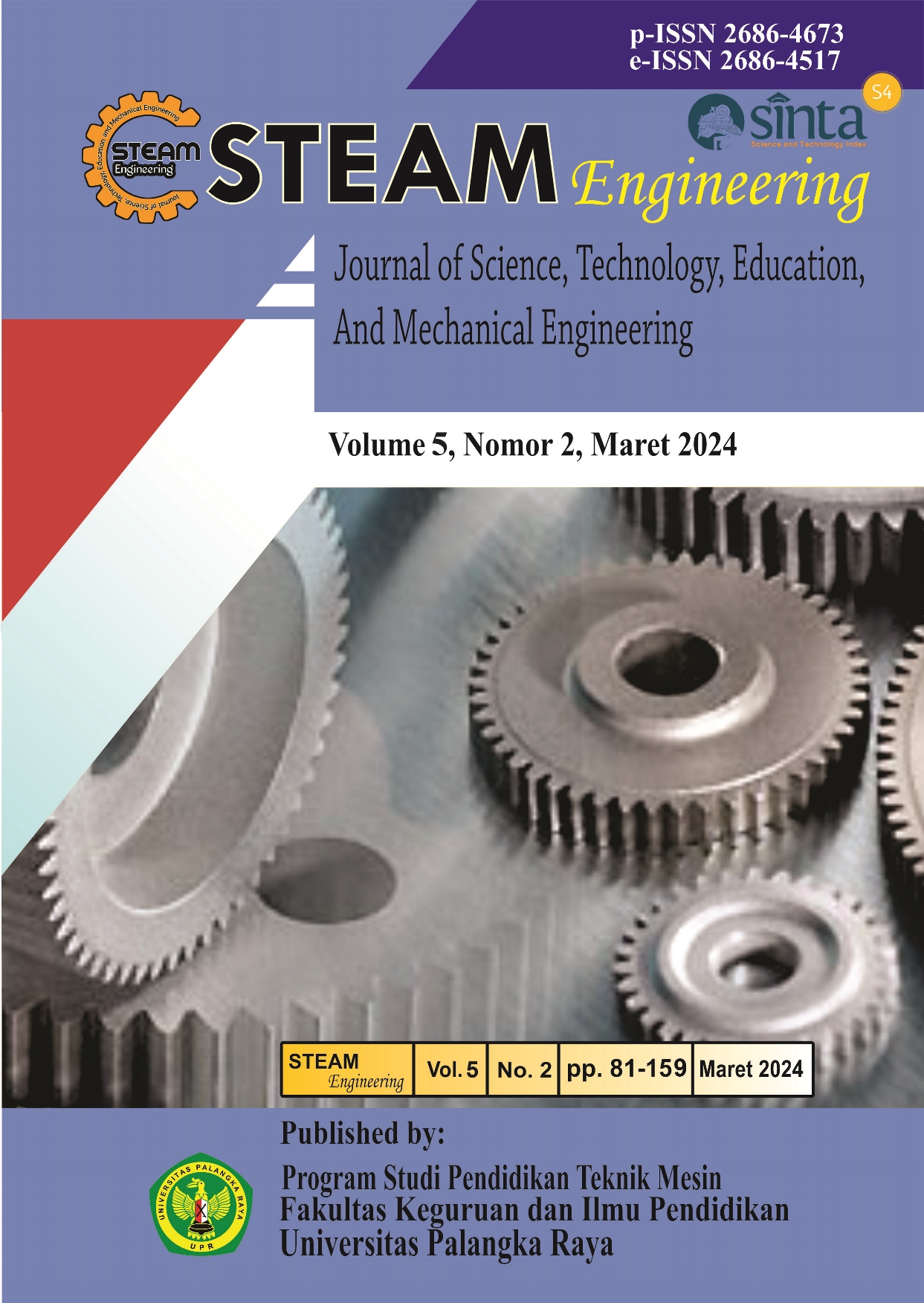EVALUASI PROGRAM PEMBELAJARAN LINK AND MATCH SMK DENGAN DUNIA USAHA/INDUSTRI
DOI:
https://doi.org/10.37304/jptm.v5i2.12976Keywords:
Evaluasi Konteks, Evaluasi Masukan, Evaluasi Proses, Evaluasi Produk, CIPP, Link and MatchAbstract
This study aims to evaluate the Link and Match learning program in Light Vehicle Engineering at SMK Karsa Mulya Palangka Raya. The evaluation covers input and process aspects conducted by the school and the business/industry partner, namely PT. Murni Berlian Motor Palangka Raya (Mitsubishi Motors). Respondents included 30 students, 3 teachers/school administrators, and 3 representatives from the business/industry partner. Data were collected through surveys, interviews, and documentation, followed by descriptive analysis. The results show, first, that the implementation of the Link and Match program is considered good based on teacher readiness, teacher competence, student preparedness, facilities, and cooperation. The input evaluation falls into the good category, with an average score of 18.00. Second, the process of implementing this program in the business/industry sector is deemed good based on the facilities and infrastructure of the industry class, the role of teachers, the role of students, and work practices at the business/industry site, with an average score of 17.07 by students and 19.00 by teachers. To support and improve the quality of the Link and Match program, it is recommended to provide varied provision to enhance students' understanding of the material and to conduct in-depth evaluations of students' comprehension of vocational competences.
Downloads
References
Cedefop. (2017). The changing nature and role of vocational education and training in Europe (Vol. 1, Issue October). https://doi.org/http://dx.doi.org/10.2801/532605 Fuller, A. (2015). Vocational Education. International Encyclopedia of the Social & Behavioral Sciences: Second Edition, November, 232-238. https://d0i.org/10.1016/B978-O-08-0970868.92091-9 Hamid, A., Shukri, M. l. , Rafikul, Manaf, A., & Hazilah, N. (2014). Malaysian graduates employability skills enhancement : an application of the importance performance analysis Rafikul Islam and Abd Manaf Noor Hazilah. J. Global Business Advancement, 7(3), 181-197 Kosine, N. R., & Lewis, M. V. (2008). Growth and Exploration: Career Development Theory and Programs of Study. Career and Technical Education Research, 33(3), 227-243. https://d0i.org/10.5328/cter33.3.227
Krause, M.S. (2018). Associational versus correlational research study design and data analysis. Quality and Quantity, 52(6), 2691-2707. https://d0i.org/10.1007/s11135-018-0687-8 Rosa, A. T. R., & Mujiarto. (2020). Teacher development potential (Creativity and innovation) education management in engineering training, coaching and writing works through scientific knowledge intensive knowledge based on web research in the industrial revolution and society. International Journal of Higher Education, 161-168. https://doi.org/10.5430/ijhe.v9n4p161 Siswandi, G., Wiyogo, W. , & Duling, J.R. (2019). Factors Affecting Preparation of the Implementation of Teaching Factory at Vocational High School State 3 Palangka Raya. 299 (lctvet 2018), 29-34. https://doi.org/10.2991/ictvet-18.2019.7 Stufflebeam, D. L. (2000). Evaluation Models: Chapter 16. The CIPP Model for Evaluation. In In: Stufflebeam, D.L., Madaus, G.F., Kellaghan, T. (eds) Evaluation Models. Evaluation in Education and Human Services, vol 49. Springer, Dordrecht. (49th ed., pp. 279—317). Springer, Dordrecht. https://d0i.org/https://d0i.org/10.1007/O-306-47559-6_16 Suharno, Pambudi, N. A., & Harjanto, B. (2020). Vocational education in Indonesia: History, development, opportunities, and challenges. Children and Youth Services Review, 115(May), 105092. https://doi.org/10.1016/j.childyouth.2020.105092 Tiew, M. Y., & Penney, D. (2006). Curriculum as praxis: Ensuring quality technical education in Singapore for the 21st century. Education Policy Analysis Archives, 14 (January 2006), 1-28. https://doi.org/10.14507/epaa.v14n26.2006 Wheelahan, L. (2015). Not just skills: what a focus on knowledge means for vocational education. Journal Curriculum Studies, 47 (6), 750-762. https://d0i.org/10.1080/00220272.2015.1089942 Wrenn, J. , & Wrenn, B. (2009). Enhancing Learning by Integrating Theory and Practice. International Journal of Teaching and Learning in Higher Education, 21(2), 258-265. http://www.isetl.org/ijtlhe/.












